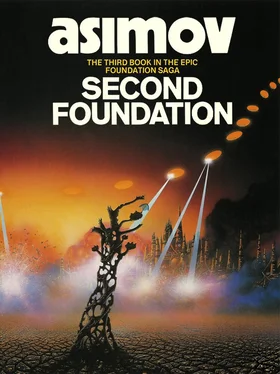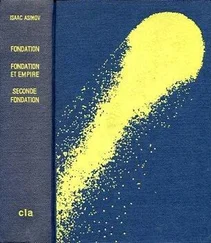At least, so he thought.
And it was because he thought wrongly, that the following day was one of confusion, both on the Unimara and in Dr. Darell’s suburban home.
It hit Dr. Darell’s home first, in point of time, through the medium of Poli, the maid, whose month’s vacation was now quite a thing of the past. She flew down the stairs in a flurry and stutter.
The good doctor met her and she tried vainly to put emotion into words but ended by thrusting a sheet of paper and a cubical object at him.
He took them unwillingly and said: “What’s wrong, Poli?”
“She’s gone, doctor.”
“Who’s gone?”
“Arcadia!”
“What do you mean, gone? Gone where? What are you talking about?”
And she stamped her foot: “ I don’t know. She’s gone, and there’s a suitcase and some clothes gone with her and there’s that letter. Why don’t you read it, instead of just standing there? Oh, you men !”
Dr. Darell shrugged and opened the envelope. The letter was not long, and except for the angular signature, “Arkady,” was in the ornate and flowing handwriting of Arcadia’s Transcriber.
Dear Father:
It would have been simply too heartbreaking to say good-by to you in person. I might have cried like a little girl and you would have been ashamed of me. So I’m writing a letter instead to tell you how much I’ll miss you, even while I’m having this perfectly wonderful summer vacation with Uncle Homir. I’ll take good care of myself and it won’t be long before I’m home again. Meanwhile, I’m leaving you something that’s all my own. You can have it now.
Your loving daughter,
Arkady.
He read it through several times with an expression that grew blanker each time. He said stiffly, “Have you read this, Poli?”
Poli was instantly on the defensive. “I certainly can’t be blamed for that, doctor. The envelope has ‘Poli’ written on the outside, and I had no way of telling there was a letter for you on the inside. I’m no snoop, doctor, and in the years I’ve been with—”
Darell held up a placating hand, “Very well, Poli. It’s not important. I just wanted to make sure you understood what had happened.”
He was considering rapidly. It was no use telling her to forget the matter. With regard to the enemy, “forget” was a meaningless word; and the advice, insofar as it made the matter more important, would have had an opposite effect.
He said instead, “She’s a queer little girl, you know. Very romantic. Ever since we arranged to have her go off on a space trip this summer, she’s been quite excited.”
“And just why has no one told me about this space trip?”
“It was arranged while you were away, and we forgot. It’s nothing more complicated than that.”
Poli’s original emotions now concentrated themselves into a single, overwhelming indignation, “Simple, is it? The poor chick has gone off with one suitcase, without a decent stitch of clothes to her, and alone at that. How long will she be away?”
“Now I won’t have you worrying about it, Poli. There will be plenty of clothes for her on the ship. It’s been all arranged. Will you tell Mr. Anthor that I want to see him? Oh, and first—is this the object that Arcadia has left for me?” He turned it over in his hand.
Poli tossed her head. “I’m sure I don’t know. The letter was on top of it and that’s every bit I can tell you. Forget to tell me, indeed. If her mother were alive—”
Darell waved her away. “Please call Mr. Anthor.”
Anthor’s viewpoint on the matter differed radically from that of Arcadia’s father. He punctuated his initial remarks with clenched fists and torn hair, and from there, passed on to bitterness.
“Great Space, what are you waiting for? What are we both waiting for? Get the spaceport on the viewer and have them contact the Unimara .”
“Softly, Pelleas, she’s my daughter.”
“But it’s not your Galaxy.”
“Now, wait. She’s an intelligent girl, Pelleas, and she’s thought this thing out carefully. We had better follow her thoughts while this thing is fresh. Do you know what this thing is?”
“No. Why should it matter what it is?”
“Because it’s a sound-receiver.”
“That thing?”
“It’s homemade, but it will work. I’ve tested it. Don’t you see? It’s her way of telling us that she’s been a party to our conversations of policy. She knows where Homir Munn is going and why. She’s decided it would be exciting to go along.”
“Oh, Great Space,” groaned the younger man. “Another mind for the Second Foundation to pick.”
“Except that there’s no reason why the Second Foundation should, a priori, suspect a fourteen-year-old girl of being a danger— unless we do anything to attract attention to her, such as calling back a ship out of space for no reason other than to take her off. Do you forget with whom we’re dealing? How narrow the margin is that separates us from discovery? How helpless we are thereafter?”
“But we can’t have everything depend on an insane child.”
“She’s not insane, and we have no choice. She need not have written the letter, but she did it to keep us from going to the police after a lost child. Her letter suggests that we convert the entire matter into a friendly offer on the part of Munn to take an old friend’s daughter off for a short vacation. And why not? He’s been my friend for nearly twenty years. He’s known her since she was three, when I brought her back from Trantor. It’s a perfectly natural thing, and, in fact, ought to decrease suspicion. A spy does not carry a fourteen-year-old niece about with him.”
“So. And what will Munn do when he finds her?”
Dr. Darell heaved his eyebrows once. “I can’t say—but I presume she’ll handle him.”
But the house was somehow very lonely at night and Dr. Darell found that the fate of the Galaxy made remarkably little difference while his daughter’s mad little life was in danger.
The excitement on the Unimara, if involving fewer people, was considerably more intense.
In the luggage compartment, Arcadia found herself, in the first place, aided by experience, and, in the second, hampered by the reverse.
Thus, she met the initial acceleration with equanimity and the more subtle nausea that accompanied the insideoutness of the first jump through hyperspace with stoicism. Both had been experienced on space hops before, and she was tensed for them. She knew also that luggage compartments were included in the ship’s ventilation system and that they could even be bathed in wall-light. This last, however, she excluded as being too unconscionably unromantic. She remained in the dark, as a conspirator should, breathing very softly, and listening to the little miscellany of noises that surrounded Homir Munn.
They were undistinguished noises, the kind made by a man alone. The shuffling of shoes, the rustle of fabric against metal, the soughing of an upholstered chair seat retreating under weight, the sharp click of a control unit, or the soft slap of a palm over a photoelectric cell.
Yet, eventually, it was the lack of experience that caught up with Arcadia. In the book-films and on the videos, the stowaway seemed to have such an infinite capacity for obscurity. Of course, there was always the danger of dislodging something which would fall with a crash, or of sneezing—in videos you were almost sure to sneeze; it was an accepted matter. She knew all this, and was careful. There was also the realization that thirst and hunger might be encountered. For this, she was prepared with ration cans out of the pantry. But yet things remained that the films never mentioned, and it dawned upon Arcadia with a shock that, despite the best intentions in the world, she could stay hidden in the closet for only a limited time.
Читать дальше
Конец ознакомительного отрывка
Купить книгу











